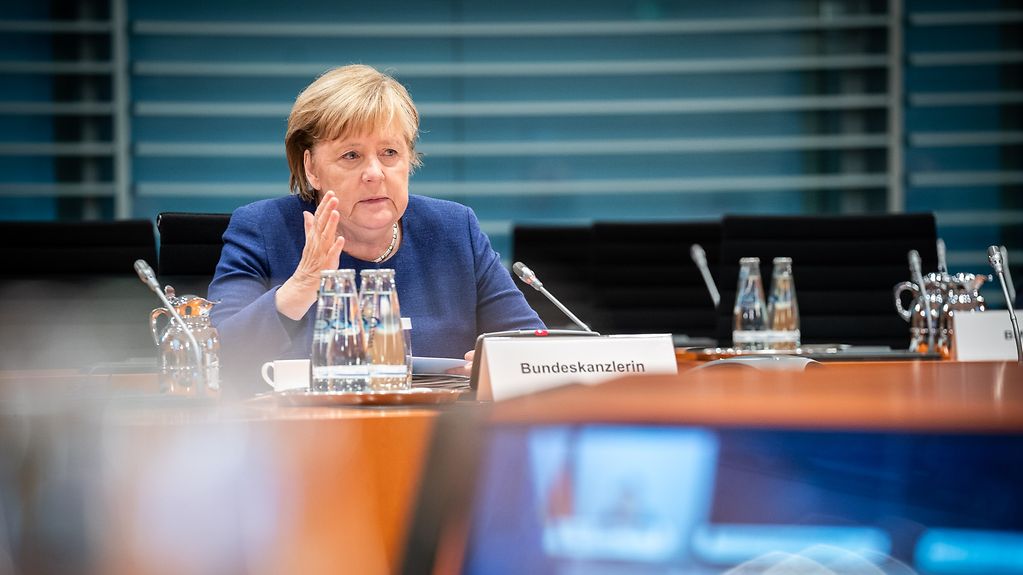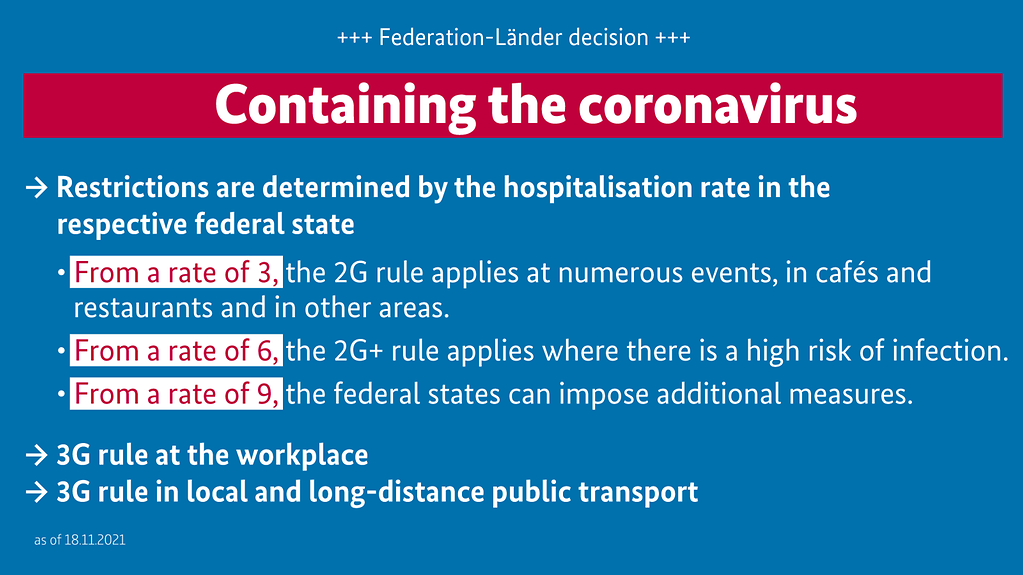Federation-Länder decision
The Federal and Länder governments have agreed on uniform, comprehensive measures to combat the pandemic. In future, restrictions will be applied in three stages based on the hospitalisation rate in the respective federal state. In addition, all those who are already vaccinated are to receive a booster jab soon.
3 min reading time

Federal Chancellor Merkel at the Federation-Länder consultations on the coronavirus pandemic.
Photo: Federal Government
“It’s high time for us to act” said Federal Chancellor Angela Merkel. “The situation is highly dramatic.” She said that what mattered now was for action to be taken quickly and consistently. It was vital to put a swift stop to the exponential increase in infections, she added, saying that everyone needed to comply with the measures so as to prevent the situation from deteriorating.
Hospitalisation rate as a benchmark
The Federal and Länder Governments have agreed on nationwide restrictions in public life based on the hospitalisation rate in the respective federal state. The hospitalisation rate is the number of COVID-19 patients admitted to hospitals per 100,000 of the population within seven days.
See here for the original wording of the Federal-Länder decision of 18 November 2021.
From a hospitalisation rate of 3, only vaccinated and recovered persons (2G) have access to leisure, cultural and sporting events, as well as to cafés, restaurants, personal care services and accommodation.
If the hospitalisation rate is above 6, vaccinated and recovered persons must additionally present a negative test (2G+). This regulation applies especially where there is a particularly high risk of infection – such as discos, clubs and bars.
In the event of very high infection rates where there is a risk of overloading the public health system, and no later than when the hospitalisation rate exceeds 9, the federal states – subject to approval by the federal state parliaments – will take further measures and can also impose contact restrictions.
If the hospitalisation rate remains below the threshold for five days in succession, the 2G rule can be suspended. Children and adolescents aged under 18 and those who cannot be vaccinated are exempt from the 2G rule.

The hospitalisation rate is the benchmark for measures to combat the coronavirus.
Photo: Federal Government
“It’s never too late to get vaccinated”
Despite the widespread success of the vaccination campaign, there are still too many people in Germany who are not yet vaccinated. This complicates and jeopardises the sustainable, comprehensive and long-term management of infections. “We could be in a better position if the vaccination gap were not so large,” said Merkel.
The Federal Chancellor appealed to all those who have not yet been vaccinated: “It’s never too late to get vaccinated. Even now, you can still act in your own interests and those of the community by getting your first jab.” Vice Chancellor Olaf Scholz also called for more people to get vaccinated: “My appeal is for everyone to pull themselves together and make a decision that will benefit themselves, their loved ones and their dependants.”
Those who are already vaccinated are also to receive a booster jab in the near future. The Federal and Länder Governments reaffirmed that this option would be made available to everyone, so it applies to several million people. “This will require a really major effort,” said the Federal Chancellor, adding that the Federal Government would be joining forces with the federal states and the municipalities to expand vaccination operations for this purpose. According to the decision, the vaccination campaign will include mobile vaccination teams, vaccination centres, hospitals, low-threshold vaccination options, doctors’ surgeries, in-house doctors and doctors at public health offices.
It also emphasises the importance of free public testing and strict testing requirements at nursing homes. In addition, the Federal and Länder Governments agreed on a bonus for nursing staff.